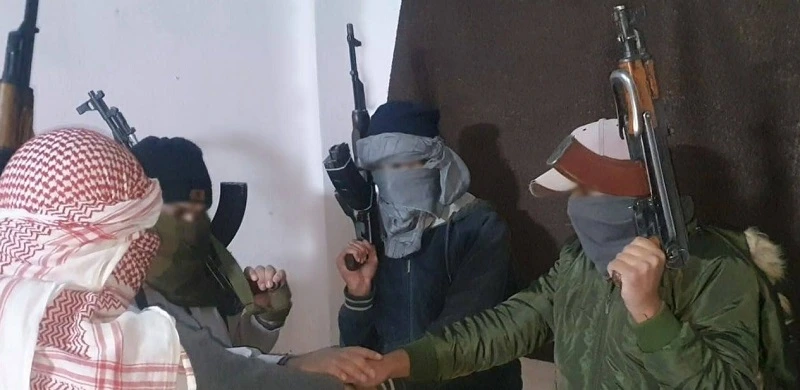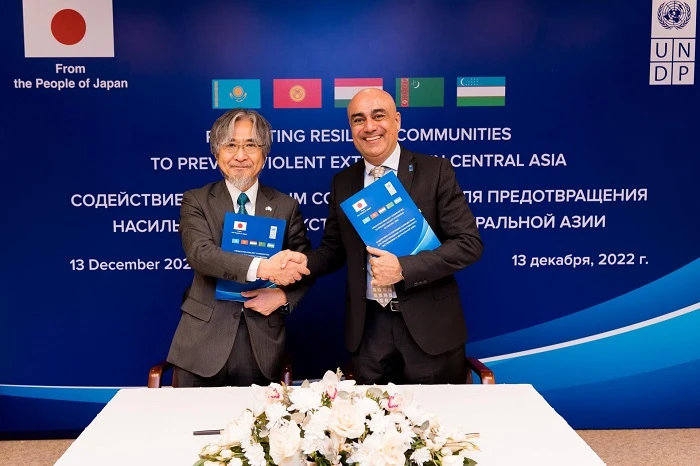

Central Asian countries consider themselves at a great geopolitical risk of being susceptible to violent extremism after the return of Taliban regime in Afghanistan
In another bid to combat violent extremism in Central Asia, Japan and the United Nations Development Programme (UNDP) signed an agreement in Astana on Tuesday to launch a new US$ 4.1 million (584 million Yen) initiative for stabilizing society and strengthening security measures in the region.
The plan aims at preventing violent extremism from permeating young people in the five Central Asian countries of Uzbekistan, Kazakhstan, Kyrgyzstan, Tajikistan, and Turkmenistan.
Sharing a long border with Afghanistan, the Central Asian countries consider themselves at great geopolitical risk of being susceptible to violent extremism after the return of the Taliban regime in Kabul.
As per the UN estimates, more than 5,000 terrorist fighters from Central Asia have travelled to Syria and Iraq and terrorism by young people from Central Asia is occurring frequently both inside and outside the region.
Experts believe that due to the spread of the Covid pandemic and the prolonged situation in Ukraine, the Central Asian region is seeing soaring prices and worsening employment conditions, thus drawing the youth of the region, who are in a vulnerable situation, into violent extremism.


“This is the second grant assistance we have provided since 2017. Kazakhstan, Kyrgyzstan, Tajikistan, and Turkmenistan, which were previously supported countries, are now joined by Uzbekistan. Japan will continue to work actively to prevent violent extremism through UNDP,” said Jun Yamada, Ambassador Extraordinary and Plenipotentiary of Japan in Kazakhstan after the signing of the agreement.
Helping local governments, UNDP has developed a comprehensive strategic framework for preventing violent extremism through inclusive development and the promotion of tolerance and respect for diversity.
“While governments in Central Asia have been at the forefront of efforts to repatriate, rehabilitate, and reintegrate their nationals returning from conflict zones, these measures present a unique set of challenges, from developing specific strategies and technical approaches to building the capacity of frontline service providers in host communities to carry out rehabilitation and reintegration processes,” the agency said in a statement.
The project will see community-based actors, such as service providers and religious leaders who have a multiplier effect in influencing positive change in communities, work with central and local government and civil society organisations to reach out to and support vulnerable community members.
“It aims to mobilise the energy, mobility, open-mindedness and dynamism of young people as a positive force to prevent violent extremist influences and narratives in target communities,” said Ivana Zivkovic, UNDP’s Director of the Regional Bureau for Europe and the Commonwealth of Independent States (CIS).
As reported by IndiaNarrative.com earlier, the Russia-led Collective Security Treaty Organisation (CSTO) has been deeply worried about the security threats emanating from the territory of Afghanistan ever since the Taliban takeover of Kabul, last year.
Tajikistan, a frontline state sharing a long border with Afghanistan (1344 km) which in many sections passes through the inaccessible high-mountainous terrain, has repeatedly expressed concerns about gangs, terrorist organisations and drug trafficking becoming more active as one of the sources of people’s survival in the region.
“Militants with experience in waging war in Syria and Iraq are being drawn there. So, it is possible that terrorists might try to destabilise the situation in neighbouring countries, including the CIS countries, and go as far as starting to expand outrightly,” Russian President Vladimir Putin had warned at a meeting of Heads of Security Agencies and Intelligence Services from member-countries of the Commonwealth of Independent States (CIS), last year.
External Affairs Ministry Spokesperson Randhir Jaiswal on Thursday has reiterated India's stance on bilateral discussions…
India implemented a new visa module for Afghan nationals on April 29, Ministry of External…
India is in touch with Iranian authorities for locating three Indian nationals who went missing…
A citywide closure occurred throughout the Awaran district in Balochistan on Wednesday, with shops, businesses,…
The Czech Republic's government has officially linked a malicious cyberattack on its Ministry of Foreign…
Chief of Defence Staff General Anil Chauhan will visit Singapore from May 30 to June…